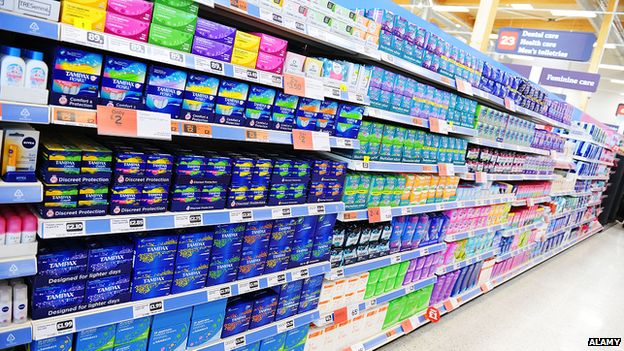North Carolina worsens the “pink tax” on menstrual products
North Carolina is one of 21 states that imposes a ”luxury tax” on menstrual products, perpetuating inequity
While supermarket aisles are stocked full of menstrual products, people across the nation struggle to afford these basic necessities due to the high taxes.
November 4, 2021
We are currently living through one of the most progressive eras in history given the recent large-scale social movements such as Black Lives Matter, #MeToo and March For Our Lives. Society is beginning to come together to fight for essential human rights and the betterment of our current political climate.
Specifically, numerous waves of feminist movements have gained mass popularity — women across the nation are joining forces to reform sexual assault laws and fight for basic reproductive rights, like the freedom to have an abortion and access forms of birth control. Perhaps one of the most urgent issues that is often overlooked is the exorbitant pricing and taxing of menstrual products, which are a necessity to billions of people across the world.
North Carolina is one of 29 states that taxes menstrual products — a sales tax is 4.75%, but can go up to 7.5% in some cities. Fortunately, my home state, Massachusetts, deems menstrual products as an exemption from their sales tax, but that doesn’t mean that they are free.
A recent study done by Huffpost revealed that people who menstruate spend roughly $1,773.33 on tampons alone throughout their lifetime, and this doesn’t even include other menstrual products, nor the sales tax that more than half of the states impose. This “pink tax” is a system of discriminatory pricing on products and services that is based on sex and is unavoidable for people who menstruate. Women have been petitioning and protesting against the high prices and taxes on basic menstrual necessities for years, but little to no progress has been made.
Access to menstrual products is a severe equity issue because many individuals struggle to afford the products that are essential to their hygiene. On a positive note, just a week ago, Governor Gavin Newsom of California signed a bill applying to California public schools and colleges, requiring them to stock their restrooms with free menstrual products. California is one of the 21 states that do not tax residents for menstrual products. This is a significant step toward guaranteeing gender equality because we can’t avoid our menstrual cycles in order to cut costs — they’re part of our biology.
Although Wake Forest University does not currently provide free menstrual products for students, several offices are coming together and are in the process of launching an initiative to provide this necessity free of charge in the next year or so. Erin Adamson of the university’s Women’s Center is currently working with the student government to pilot a Menstrual Equity Committee. “This committee is not only about getting [menstrual] products at universities, but about equal access to products in general,” said Adamson.
A pilot program is launching in the spring that will put these products in a few places on campus, which is a great step toward achieving menstrual equity. If anyone is interested in joining the program to help guarantee equal access to menstrual products, don’t hesitate to reach out to Erin Adamson via her email, adamsoe@wfu.edu.
That said, it’s shocking that Wake Forest does not provide these products on campus already, especially considering North Carolina’s high sales tax. Thousands of students and professors alike have an inevitable dent in their bank account created by period products, and the university has the capability to reduce that dent. However, I am encouraged by the steps the university is now taking.
A conversation about the pink tax on menstrual products needs to make its way to the forefront of women’s rights issues. Menstruation is often seen as an uncomfortable topic, especially in the eyes of cisgender men, but the expense of menstrual products creates a large equity issue. If 21 states have eliminated the ridiculous sales tax that deems menstrual products a “luxury item,” why can’t North Carolina and the other 28 states imposing the pink tax follow in their footsteps?
Menstrual products are most certainly not “luxury items,” as the states that tax these products claim them to be — they are a basic, human necessity for getting through menstrual cycles in a safe and hygienic manner. Women, transgender men and non-binary individuals are already going to lose thousands of dollars throughout their lifetime, because of a biological cycle that they cannot control — states have the ability to lessen this debt by removing their sales tax, yet they fail to do so.
What’s equally disheartening is that many people are unaware that the pink tax extends beyond menstrual products — it also includes extra payments for everyday items such as women’s razors, shampoo, haircuts, clothes and dry cleaning. More often than not, the tax takes the form of artificially elevated prices that women pay for the same products as men. This issue is certainly important to discuss because the most pressing matter involves eliminating the sales tax on menstrual products across the nation.
Many states do not tax medical and health supplies, but menstrual products are exempt from this category. Clearly, tampons, pads, panty liners and every other form of menstrual product fall under the category of a health supply because they are essential to the daily lives and physical health of those who menstruate!
It’s time to pressure governments both at the state and federal level to remove this debilitating tax because it creates a direct inequality for people seeking these products. This tax tells us that our menstrual cycle is simply not a matter of health or medical value. Our health and well-being is a basic human right though, and the pink tax tells us we are not worthy of this right.















